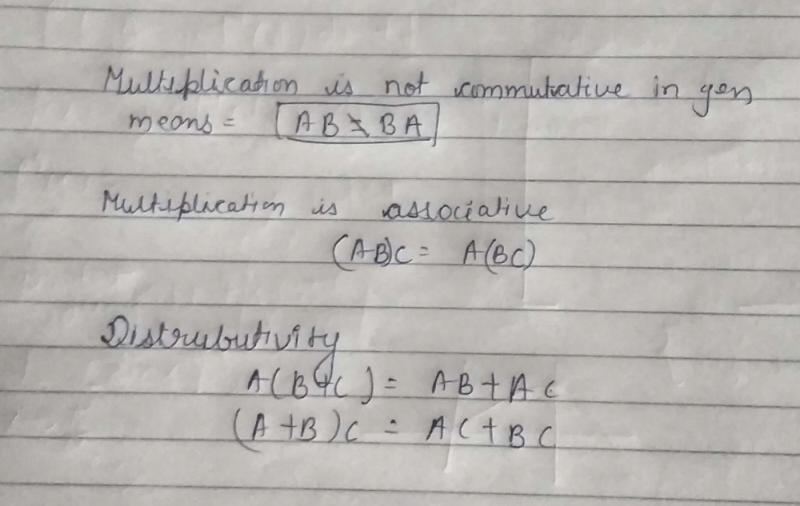JEE Exam > JEE Questions > Which of the following property of matrix mul...
Start Learning for Free
Which of the following property of matrix multiplication is correct:
- a)Multiplication is not commutative in genral
- b)Multiplication is associative
- c)Multiplication is distributive over addition
- d)All of the mentioned
Correct answer is option 'D'. Can you explain this answer?
Verified Answer
Which of the following property of matrix multiplication is correct:a)...
Matrix multiplication is associative, distributive, but not commutative.
View all questions of this test
Most Upvoted Answer
Which of the following property of matrix multiplication is correct:a)...

Free Test
FREE
| Start Free Test |
Community Answer
Which of the following property of matrix multiplication is correct:a)...
Introduction:
Matrix multiplication is an important operation in linear algebra. It involves multiplying two matrices to obtain a new matrix. There are several properties associated with matrix multiplication, and in this response, we will discuss each property and explain why option 'D' is the correct answer.
Multiplication is not commutative in general:
Matrix multiplication is not commutative in general, which means that the order of multiplication matters. When two matrices A and B are multiplied, it is possible that AB ≠ BA. This property can be demonstrated with a simple example. Let's consider two matrices A and B:
A = [1 2]
[3 4]
B = [5 6]
[7 8]
When we multiply AB, we get:
AB = [1*5+2*7 1*6+2*8]
[3*5+4*7 3*6+4*8]
= [19 22]
[43 50]
On the other hand, when we multiply BA, we get:
BA = [5*1+6*3 5*2+6*4]
[7*1+8*3 7*2+8*4]
= [23 34]
[31 46]
As we can see, AB ≠ BA, which demonstrates that matrix multiplication is not commutative in general.
Multiplication is associative:
Matrix multiplication is associative, which means that when three matrices A, B, and C are multiplied, the order of multiplication does not matter. Mathematically, (AB)C = A(BC). This property can be proven by expanding the expressions of both sides and showing that they are equal.
Multiplication is distributive over addition:
Matrix multiplication is distributive over addition, which means that when we have three matrices A, B, and C, and we multiply A by the sum of B and C, it is the same as multiplying A by B and then adding the result to A multiplied by C. Mathematically, A(B + C) = AB + AC. This property is also proven by expanding the expressions and showing their equality.
Conclusion:
In conclusion, matrix multiplication has various properties associated with it. While it is not commutative in general, it is associative and distributive over addition. Therefore, option 'D' is the correct answer as all of the mentioned properties are true for matrix multiplication. These properties play a crucial role in various applications of matrix algebra, such as solving systems of linear equations, transformations, and more.
Matrix multiplication is an important operation in linear algebra. It involves multiplying two matrices to obtain a new matrix. There are several properties associated with matrix multiplication, and in this response, we will discuss each property and explain why option 'D' is the correct answer.
Multiplication is not commutative in general:
Matrix multiplication is not commutative in general, which means that the order of multiplication matters. When two matrices A and B are multiplied, it is possible that AB ≠ BA. This property can be demonstrated with a simple example. Let's consider two matrices A and B:
A = [1 2]
[3 4]
B = [5 6]
[7 8]
When we multiply AB, we get:
AB = [1*5+2*7 1*6+2*8]
[3*5+4*7 3*6+4*8]
= [19 22]
[43 50]
On the other hand, when we multiply BA, we get:
BA = [5*1+6*3 5*2+6*4]
[7*1+8*3 7*2+8*4]
= [23 34]
[31 46]
As we can see, AB ≠ BA, which demonstrates that matrix multiplication is not commutative in general.
Multiplication is associative:
Matrix multiplication is associative, which means that when three matrices A, B, and C are multiplied, the order of multiplication does not matter. Mathematically, (AB)C = A(BC). This property can be proven by expanding the expressions of both sides and showing that they are equal.
Multiplication is distributive over addition:
Matrix multiplication is distributive over addition, which means that when we have three matrices A, B, and C, and we multiply A by the sum of B and C, it is the same as multiplying A by B and then adding the result to A multiplied by C. Mathematically, A(B + C) = AB + AC. This property is also proven by expanding the expressions and showing their equality.
Conclusion:
In conclusion, matrix multiplication has various properties associated with it. While it is not commutative in general, it is associative and distributive over addition. Therefore, option 'D' is the correct answer as all of the mentioned properties are true for matrix multiplication. These properties play a crucial role in various applications of matrix algebra, such as solving systems of linear equations, transformations, and more.

|
Explore Courses for JEE exam
|

|
Similar JEE Doubts
Question Description
Which of the following property of matrix multiplication is correct:a)Multiplication is not commutative in genralb)Multiplication is associativec)Multiplication is distributive over additiond)All of the mentionedCorrect answer is option 'D'. Can you explain this answer? for JEE 2025 is part of JEE preparation. The Question and answers have been prepared according to the JEE exam syllabus. Information about Which of the following property of matrix multiplication is correct:a)Multiplication is not commutative in genralb)Multiplication is associativec)Multiplication is distributive over additiond)All of the mentionedCorrect answer is option 'D'. Can you explain this answer? covers all topics & solutions for JEE 2025 Exam. Find important definitions, questions, meanings, examples, exercises and tests below for Which of the following property of matrix multiplication is correct:a)Multiplication is not commutative in genralb)Multiplication is associativec)Multiplication is distributive over additiond)All of the mentionedCorrect answer is option 'D'. Can you explain this answer?.
Which of the following property of matrix multiplication is correct:a)Multiplication is not commutative in genralb)Multiplication is associativec)Multiplication is distributive over additiond)All of the mentionedCorrect answer is option 'D'. Can you explain this answer? for JEE 2025 is part of JEE preparation. The Question and answers have been prepared according to the JEE exam syllabus. Information about Which of the following property of matrix multiplication is correct:a)Multiplication is not commutative in genralb)Multiplication is associativec)Multiplication is distributive over additiond)All of the mentionedCorrect answer is option 'D'. Can you explain this answer? covers all topics & solutions for JEE 2025 Exam. Find important definitions, questions, meanings, examples, exercises and tests below for Which of the following property of matrix multiplication is correct:a)Multiplication is not commutative in genralb)Multiplication is associativec)Multiplication is distributive over additiond)All of the mentionedCorrect answer is option 'D'. Can you explain this answer?.
Solutions for Which of the following property of matrix multiplication is correct:a)Multiplication is not commutative in genralb)Multiplication is associativec)Multiplication is distributive over additiond)All of the mentionedCorrect answer is option 'D'. Can you explain this answer? in English & in Hindi are available as part of our courses for JEE.
Download more important topics, notes, lectures and mock test series for JEE Exam by signing up for free.
Here you can find the meaning of Which of the following property of matrix multiplication is correct:a)Multiplication is not commutative in genralb)Multiplication is associativec)Multiplication is distributive over additiond)All of the mentionedCorrect answer is option 'D'. Can you explain this answer? defined & explained in the simplest way possible. Besides giving the explanation of
Which of the following property of matrix multiplication is correct:a)Multiplication is not commutative in genralb)Multiplication is associativec)Multiplication is distributive over additiond)All of the mentionedCorrect answer is option 'D'. Can you explain this answer?, a detailed solution for Which of the following property of matrix multiplication is correct:a)Multiplication is not commutative in genralb)Multiplication is associativec)Multiplication is distributive over additiond)All of the mentionedCorrect answer is option 'D'. Can you explain this answer? has been provided alongside types of Which of the following property of matrix multiplication is correct:a)Multiplication is not commutative in genralb)Multiplication is associativec)Multiplication is distributive over additiond)All of the mentionedCorrect answer is option 'D'. Can you explain this answer? theory, EduRev gives you an
ample number of questions to practice Which of the following property of matrix multiplication is correct:a)Multiplication is not commutative in genralb)Multiplication is associativec)Multiplication is distributive over additiond)All of the mentionedCorrect answer is option 'D'. Can you explain this answer? tests, examples and also practice JEE tests.

|
Explore Courses for JEE exam
|

|
Signup to solve all Doubts
Signup to see your scores go up within 7 days! Learn & Practice with 1000+ FREE Notes, Videos & Tests.





















